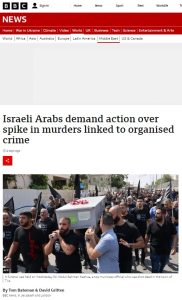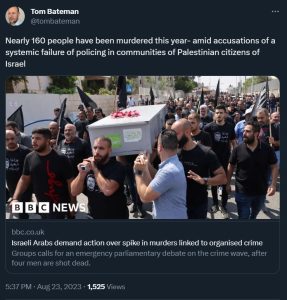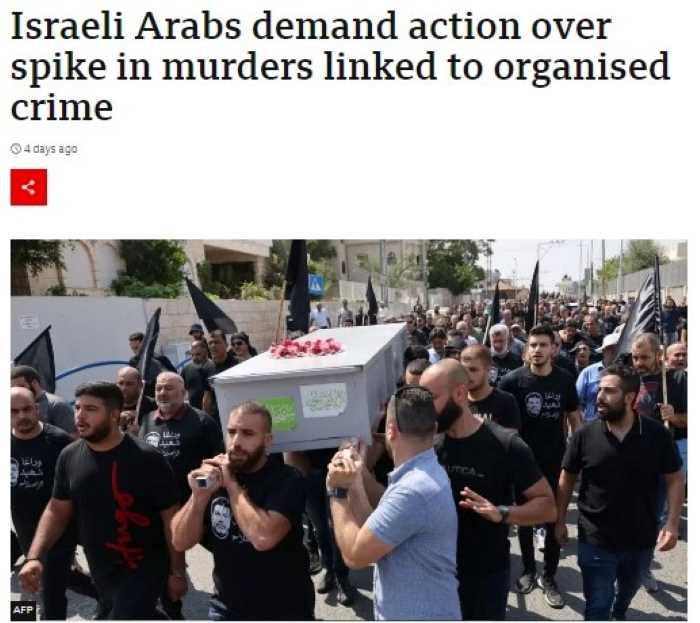On the afternoon of August 23rd the BBC News website published a report by Tom Bateman and David Gritten headlined ‘Israeli Arabs demand action over spike in murders linked to organised crime’.
Over the past two years the BBC News website has published a number of items concerning crime in Israel’s Arab sector, two of which – both written by Yolande Knell and previously discussed here – are re-promoted at the bottom of this report.
BBC’S KNELL OPTS FOR THE EASY NARRATIVE IN REPORTS ON ARAB CRIME
ANOTHER SUPERFICIAL BBC REPORT ON CRIME IN ISRAEL’S ARAB SECTOR
As in those previous reports (and others), Gritten and Bateman promote the claim that “many” of Israel’s Arab citizens “prefer to be called” Palestinian – despite the fact that surveys show that the majority do not identify as such – along with unevidenced allegations of “state discrimination”.
“Israeli Arabs – many of whom prefer to be called Palestinian citizens of Israel – make up a fifth of the country’s population.
In theory, they have equal rights with Jewish citizens, but they routinely complain of state discrimination.”
Having cited recent incidents in three different locations (Abu Snan, Lakiya and Tira), Bateman and Gritten go on to tell their readers that:
“The killings are believed to be connected to organised crime gangs within the Israeli Arab community, as a spiralling murder rate sends shockwaves through its population of around two million.
Almost 160 people have been murdered this year alone. That is already 40% more than the total reported in 2022 by the Abraham Initiatives, a group that promotes Israeli Arab and Jewish equality.
One political party – the Arab Movement for Renewal (Taal) – is demanding urgent action by the Israeli authorities, with many blaming a failure of representation and proper policing by the state.
The politics around solving the issue are becoming increasingly febrile.”
With no attempt made to explain that allegation of “a failure of representation” in a country in which all citizens of whatever ethnic background have equal votes and which has always had Arab members of parliament – including ten in the current Knesset on four different lists – Bateman and Gritten go on to devote seven paragraphs to the topic of statements made by various government and opposition politicians.
In other words, what readers once again take away from this portrayal of the issue of crime in the Arab sector of Israeli society is that it can be blamed on inadequate policing and contemporary politics. That, however, is by no means the whole story.
A report recently released by the INSS notes the link between the gender of those killed and the types of crime:
“Between January 2012 and June 2023, 856 men and 143 women were murdered. The average age of male and female victims was 33 and 34, respectively. The number of female victims has remained constant over time, with twelve victims annually, whereas the number of male victims has risen considerably. This supports the claim that most of the increase in the number of murders can be attributed to the increasing activity of criminal organizations and power struggles between clans, which affect the number of murdered men, and not to domestic violence, which mostly affects women.”
While noting the connection of organised crime gangs to the “spiralling murder rates”, Bateman and Gritten fail to provide any explanations for that increase in their activities in recent years. As reported by the Times of Israel nearly three years ago:
“In a 2020 draft report on violence in Arab society, the Prime Minister’s Office came to the same conclusion that Arab Israeli leaders and civil society organizations did: Organized crime is the most significant engine of violence in Arab cities and towns.
The phenomenon is fairly new, and partially an effect of official efforts to crack down on rampant organized crime in the Jewish community.
“In the 1980s, most organized crime was Jewish, with Arab contractors. But these Arab contractors were not particularly organized, nor were they in positions of power in the organizations,” said Mahmoud Nassar, who directed the anti-crime division within Nazareth’s City Hall for over two decades.
In the early 2000s, prime minister Ariel Sharon ordered law enforcement to crack down on crime in the country’s Jewish cities. The situation had become unbearable: Crime organizations were slaughtering one another in the streets in Netanya and Ashdod. […]
The police, the state attorney and the Israeli Tax Authority ultimately uprooted these organizations after wide-ranging and complex investigations. […]
“Crime is like a weather system. It never vanishes. It merely travels from high-pressure to low-pressure areas. For years, there has been less pressure in Arab areas. When the state began to fight organized crime in Netanya and Ashdod and Tel Aviv, they simply moved 15 kilometers over to the Triangle,” said Amnon Be’eri-Soliziano, co-director of the Abraham Initiatives, referring to a collection of Arab cities and towns in central Israel.
No longer in the shadow of Jewish organizations, the Arab groups developed into complex institutions, said criminologist Walid Haddad. Haddad, who now teaches at Western Galilee College, served for fifteen years in Israeli law enforcement as a national inspector in the Public Security Ministry before entering academia.”
A further component to the story – which the BBC has serially under-reported over the past two years – relates to illegal weapons. As noted by the INSS in 2021:
“The number of illegal weapons possessed by gangs and criminal organizations, as well as ordinary civilians for the purpose of self-defense, has increased. Tens of thousands of weapons in Arab communities are estimated stolen from IDF bases or smuggled from Palestinian Authority areas.”
In addition, weapons are smuggled into Israel from surrounding countries but that topic has received very little BBC coverage to date. For example, a recent case in which four Israeli Arab citizens were arrested for smuggling weapons supplied by Hizballah into Israel for criminal purposes was not reported at all by the BBC.
Another part of the current picture concerns the five-yearly municipal elections due to be held in Israel in two months’ time, as reported by the Times of Israel.
““Local officials in our communities have an extremely hard life,” Badi Hasisi, director of the Institute of Criminology at the Hebrew University’s Law Faculty in Jerusalem, told The Times of Israel in an interview.
“They are under heavy pressure from local stakeholders, be it powerful families or criminal gangs. Meddling in local politics is not a new phenomenon and it is not unique to Arab society, but it’s much more prevalent in our cities and towns.”
“The local government has a central place in the life of Arab citizens,” Hasisi said. “While Arab voters mostly turn out in low numbers for Knesset elections, their voting rate is twice as high when it comes to municipal elections. Everyone wants to have a stake in how a town is run.” […]
Municipal elections are scheduled to be held throughout Israel on October 31. Arab local officials from the north to the south have reported acts of intimidation and threats, such as shootings outside their homes, their cars being set on fire, and even one grenade launch. […]
“Of course, much of the threats and pressure on local leaders come from organized crime. Directors general, such as the victim of Monday’s killing, are the main decision makers when it comes to public tenders, for example for garbage removal, where large sums of money are involved,” Hasisi said.”
Bateman and Gritten erased all those relevant factors (and others, such as the issue of women murdered by family members) from their portrayal of crime in Israel’s Arab sector. Despite promoting the allegation of a lack of “proper policing”, their report was not updated to include subsequent developments in either some of the cases they mentioned or additional ones.
The result is that yet again BBC audiences get an inadequate picture of the complex and multi-faceted issue of crime in the Arab sector of Israeli society.
Related Articles:




